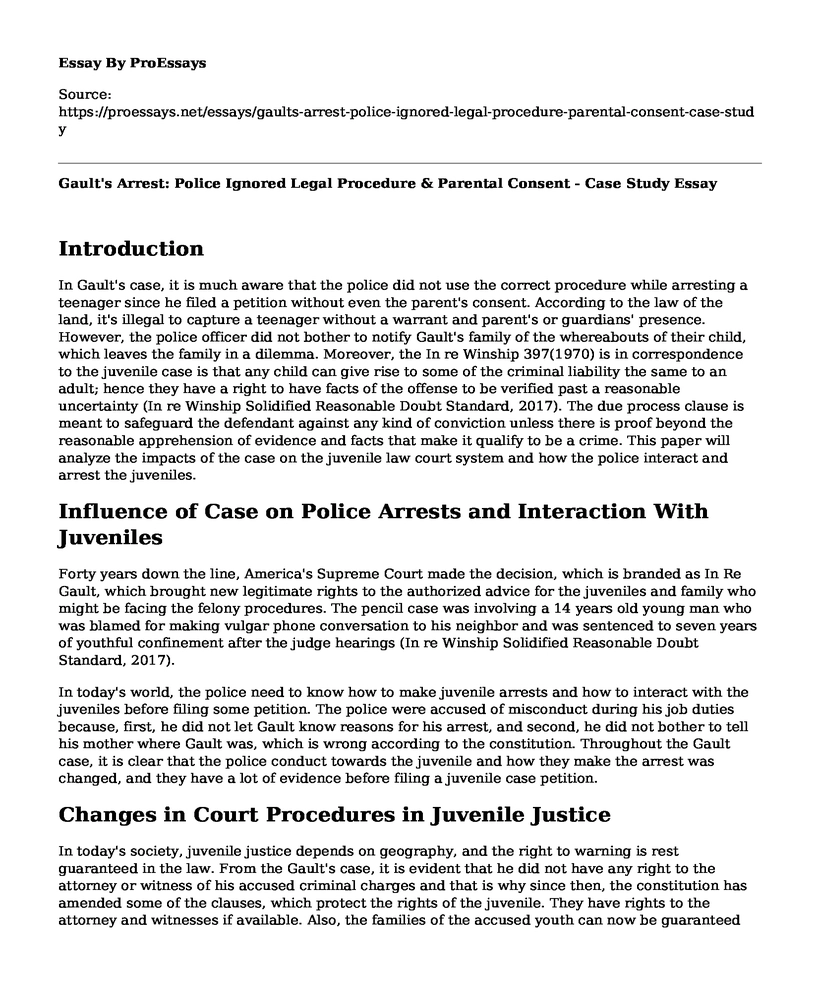Introduction
In Gault's case, it is much aware that the police did not use the correct procedure while arresting a teenager since he filed a petition without even the parent's consent. According to the law of the land, it's illegal to capture a teenager without a warrant and parent's or guardians' presence. However, the police officer did not bother to notify Gault's family of the whereabouts of their child, which leaves the family in a dilemma. Moreover, the In re Winship 397(1970) is in correspondence to the juvenile case is that any child can give rise to some of the criminal liability the same to an adult; hence they have a right to have facts of the offense to be verified past a reasonable uncertainty (In re Winship Solidified Reasonable Doubt Standard, 2017). The due process clause is meant to safeguard the defendant against any kind of conviction unless there is proof beyond the reasonable apprehension of evidence and facts that make it qualify to be a crime. This paper will analyze the impacts of the case on the juvenile law court system and how the police interact and arrest the juveniles.
Influence of Case on Police Arrests and Interaction With Juveniles
Forty years down the line, America's Supreme Court made the decision, which is branded as In Re Gault, which brought new legitimate rights to the authorized advice for the juveniles and family who might be facing the felony procedures. The pencil case was involving a 14 years old young man who was blamed for making vulgar phone conversation to his neighbor and was sentenced to seven years of youthful confinement after the judge hearings (In re Winship Solidified Reasonable Doubt Standard, 2017).
In today's world, the police need to know how to make juvenile arrests and how to interact with the juveniles before filing some petition. The police were accused of misconduct during his job duties because, first, he did not let Gault know reasons for his arrest, and second, he did not bother to tell his mother where Gault was, which is wrong according to the constitution. Throughout the Gault case, it is clear that the police conduct towards the juvenile and how they make the arrest was changed, and they have a lot of evidence before filing a juvenile case petition.
Changes in Court Procedures in Juvenile Justice
In today's society, juvenile justice depends on geography, and the right to warning is rest guaranteed in the law. From the Gault's case, it is evident that he did not have any right to the attorney or witness of his accused criminal charges and that is why since then, the constitution has amended some of the clauses, which protect the rights of the juvenile. They have rights to the attorney and witnesses if available. Also, the families of the accused youth can now be guaranteed the right to appeal and have witnessed the court hearings before the verdict decision making.
The Gault case, whereby the judge ruled he be sentenced for seven years, is a clear contravention of the sixth modification. This was because he was deprived of the constitutional rights to the lawyer, was not aware of his charges against him; he had no chance to face the accusers and was not aware of his rights besides self-incrimination (Facts and Case Summary - In re Gault). Due to the appealing process, the Gault's court said that it is against the 14th amendment, which does not allow the use of coerced confession in the court of law, not even to a child, or an adult is allowed to be condemned flout methods that are against the process of law.
References
Facts and Case Summary - In re Gault. (n.d.). Retrieved April 9, 2020, from https://www.uscourts.gov/educational-resources/educational-activities/facts-and-case-summary-re-gault
In re Winship Solidified Reasonable Doubt Standard. (2017, November 1). Retrieved April 9, 2020, from https://constitutionallawreporter.com/2017/11/01/in-re-winship-1970/
Cite this page
Gault's Arrest: Police Ignored Legal Procedure & Parental Consent - Case Study. (2023, May 16). Retrieved from https://proessays.net/essays/gaults-arrest-police-ignored-legal-procedure-parental-consent-case-study
If you are the original author of this essay and no longer wish to have it published on the ProEssays website, please click below to request its removal:
- Psychology Essay Sample on Psychodynamic Theory in Delinquent Behavior
- Landmark Cases Decided By the U.S. Supreme Court in the 1960s and 1970s
- Paper Example on Jews and Civil Rights Movement
- Rights of an Engineer Essay Example
- Crime: Learned Behaviour: Sutherland's Differential Association Theory - Essay Sample
- The Dark Side of Technology: The Growing Threat of Cybercrime - Essay Sample
- Essay on Digital Forensics Certifications: Meeting Society's Demand for Cybercrime Prevention







